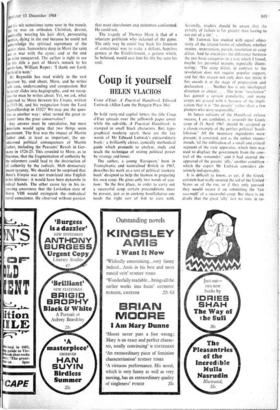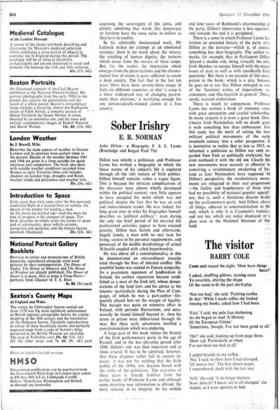Coup it yourself
HELEN VLACHOS
Coup d'Etat: A Practical Handbook Edward Luttwak (Allen Lane the Penguin Press 30s) In bold rusty-red capital letters the title Coup d'Etat spreads over the yellowish paper cover while the sub-title, A Practical Handbook, is stamped in small black characters. But, typo- graphical modesty apart, these are the key words of Mr Edward Luttwak's extraordinary book : a brilliantly clever, cynically methodical guide which proceeds to analyse, study and teach the technique of seizing political power by strategy and force.
The author, a young 'European,' born in Transylvania and naturalised British in 1967, describes his work as a sort of political 'cookery book' designed to help the layman in preparing his own coup. He gives only two words of cau- tion: 'In the first place, in order to carry out a successful coup certain preconditions must be present, just as in cooking bouillabaisse one needs the right sort of fish to start with.
Secondly, readers should be aware that the penalty of failure is far greater than having to cat out of a tin.' .
Mr Luttwak has studied with equal objec- tivity all the related forms of rebellion, whether mutiny, insurrection, putsch, revolution or coup d'etat. And he elucidates the difference between the two basic categories in a way which I found, maybe for personal reasons, especially illumi- nating: 'The coup d'Oat, in contrast to the revolution does not require popular support, and for this reason not only does not invite it but avoids it at the stage of preparation and declaration . . . Neither has it any ideological direction or object . . . The term "revolution" • has gained a certain popularity, and many coups arc graced with it because of the impli- cation that it is "the people" rather than a few plotters who were responsible.'
In future editions of the Handboo4 (whose success, I am confident, is assured) the Greek-- coup of 21 April 1967 should be accepted as a classic example of the perfect political 'bond., labaisse.' All the necessary ingredients were present; it consisted, just as the author recom- mends, 'of the infiltration of a small and critical ' segment of the state apparatus, which then was- used to displace the government from the con,- trol of the remainder,' and it had secured tbe approval of the greater 'ally.' another condition which the expert Mr Luttwak considerk ab- solutely indispensable. .
11 is difficult to know, as yet. if the Greek colonels had really secured the aid of the United- States or of the cis. or if they only guessed they would secure it on submitting the 'fait • accompli' of a successful coup. But there is no doubt that the great 'ally' lost no time in re-
cognising the sovereignty of the junta, and silently admitting that words like democracy or 7freedom have the same value in dollars as they have in roubles.
In his admirably documented work, Mr Luttwak makes no attempt at ad emotional scrutiny; there is no word about the misery, the crushing of human dignity, the tortures which ensue from the success of these coups. But, for the reader, the impression which emerges from the plain statistics and the chrono- logical lists of events is quite sufficient to create a deep anxiety. The fact that in the last ten years there have been seventy-three coups in forty-six different countries, or that 'a coup is a more widespread way of changing govern- ment than elections,' is terrifying enough for any democratically-minded citizen of a free country.















































 Previous page
Previous page